
What exactly are vocab in context questions, and what are the best ways to approach answering them? In this article, I'll start by going over the basics of what vocab in context questions are, then segue into an in-depth discussion of each of the two types (complete with examples). Finally, I'll wrap it up by suggesting strategies to use when tackling these types of questions.
feature image credit: 7dc_b188407-zuleikha-reading by Wolfgang Lonien used under CC BY-SA 2.0/Cropped from original.
What Are Vocab In Context Questions?
Vocabulary in context questions are the questions on ACT Reading that question you directly about vocabulary in the context of a paragraph. While having vocab knowledge can help you with other types of questions, for the purposes of this article I've focused on the types of questions where knowing vocabulary is essential to being able to get the right answer.
From my reviewing of dozens of official ACT practice tests, I've come to the conclusion that there are two types of ways the ACT Reading will question you on vocabulary:
- Based on how the word is used in the passage, what does that word mean?
- How would you sum up the meaning of a few lines or a paragraph, using one word as your answer?
Read on for a more in-depth look at each of these types of vocab in context questions.
Question Type 1: What’s The Meaning Of The Word In Context?
These questions are probably among the most straightforward of all the ACT Reading questions. I like to think of them as asking “Here’s the word – what’s the definition?”
Just because the questions are straightforward doesn’t mean that they can't be tricky, but the way the questions are phrased themselves are pretty simple. In fact, they are almost always asked in the following way:
- As it is used in line [number], the word [X] most nearly means...
Or, to give a concrete example:
- As it is used in line 42, the word howled most nearly means…
Why does the ACT always use the phrase "most nearly," rather than just straight up asking "what does this word mean?" I believe there are two reasons:
- the phrase is designed to trick you into picking an answer that kind of works (after all, howled only has to NEARLY mean the answer choice, right?)
- it's the ACT’s way of covering its butt (nope, you can't just pick AN answer that works, you have to pick the BEST answer out of the available choices).
Most often, these "Here's the word, what's the definition?" questions are about words that have multiple meanings. Since the ACT wants to trick you into rushing into thinking you know the answer, the test often will include an answer choice that is accurate for SOME definition of the word, just not the way it’s used in the passage. Here’s an example, taken verbatim from an official ACT practice test.

Off the top of my head, the word read can be used to mean any of the answers, with the possible exception of choice C. In order to figure out which way read is being used in line 45, you'll have to go back to the passage. The source sentence is as follows:
“Scientists determine an eel’s age using a microscope to read the growth rings of its otolith – a small, hard calcium deposit at the base of its skull.” (lines 44-47; italics mine)
So how would you solve this question? First, rephrase the word or phrase in question to make answering the question easier: “Scientists figure out how old an eel is using a microscope to look at and decipher the growth rings on the thing.” As you can see, the rephrasing does not have to be super elegant, just accurate.
Next, substitute answers into your rephrased sentence – for this question, only “observe” makes sense (Scientists figure out how old an eel is using a microscope to observe the growth rings on the thing).
Want another example? Not a problem! Here’s a trickier example I’ve modified from an ACTual ACT (I could only hold out on that wordplay for so long).
Practice Example A:
“The lycanthropic virus story is really nailed down,” says Giles. “The epicenters that have been mapped over thousands of years are likely the spots where werewolves are concentrated.”
As it is used in this line, concentrated most nearly means…
(A) extracted
(B) paid attention to
(C) gathered together
(D) directed to one topic
If you replaced the word “concentrated” with any of the answer choices, it COULD make thematic sense. After all, werewolves could be extracted from a place, or be paid attention to (although it seems unlikely that the ACT would have you pick an answer choice that means ending a sentence with a preposition). Also, doesn’t “concentrated” sometimes have something to do with things being directed to one topic?
Danger! Danger! This is all part of the ACT’s Cunning Plan™ (NB: not actually trademarked) to trap you!
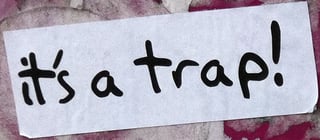 It’s a trap by Mike Knell, used under CC BY-SA 2.0/Cropped from original.
It’s a trap by Mike Knell, used under CC BY-SA 2.0/Cropped from original.
Do NOT answer the question based on things that “could be right,” depending on information you do not know.
Imagine you're a cranky English teacher, grading student interpretations of a book read for class. You're not a generous teacher who’s looking for reason to give a student points any way you can because she argued the point. No, you're looking for reasons to mark answers as WRONG.
Take that mindset into the ACT Reading with you: Only the answer that is directly supported by the context of the passage is acceptable. In the case of example A above, the answer is (C) gathered together: the centers of the lycanthropic virus infection are likely the spots where werewolves are gathered together.
None of the answer choices come even close to fitting into context of this sentence.
On occasion, rather than asking about specific words, ACT Reading will instead ask about multiple words, making the question more like "Here's the phrase, what's the meaning?" See example B:
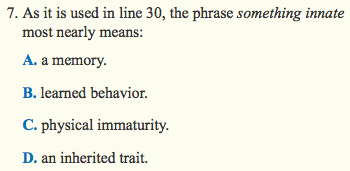 Example taken from ACT website.
Example taken from ACT website.
In either case, these questions should be approached in the same way: always, always go back to the line in which the word or phrase appears – don’t let the ACT fool you into answering without checking!
Question Type 2: What Word Is Defined By The Passage?
These questions ask you to recognize the definition in the passage and relate it to the answer choice that matches it. In contrast to the previous question type of vocab-in-context questions, I think of these as asking “Here’s the definition, what’s the word?”
The ACT has more varied ways of asking these questions than the “here’s the word, what’s the meaning?” questions. I've listed below just a few examples that I came across in my reviewing of ACT practice tests. Disclaimer: I have edited the questions so that they all refer to the same subject matter; these are not how the questions appeared on the actual ACT.
Sample "Here's the definition, what's the word?" questions:
- Which of the following words best describes the narrator’s father working as he prepares for the full moon?
- Which of the following best describes how the victim referred to in the fifth paragraph (lines 58-71) is said to have started to transform into a werewolf?
- Lines 42-53 suggest that, prior to W. Rosenberg’s research, medical researchers had thought of the werewolf as…
 Halloween Duck: Werewolf Duck by Joshua Smith, used under CC BY-SA 2.0/Cropped from original.
Halloween Duck: Werewolf Duck by Joshua Smith, used under CC BY-SA 2.0/Cropped from original.Answer to the last question: Apparently as round, yellow, and half-wolf, half…duck in a shirt?
"What word is defined by the passage?" questions can actually be easier than the "here's the word, what's the definition?" questions. Why? Because since the definitions are in paragraph form, you may be able to gather more information to help answer the question. Here's another actual ACT sample question:
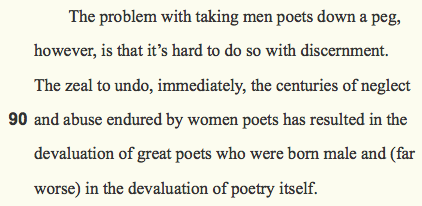
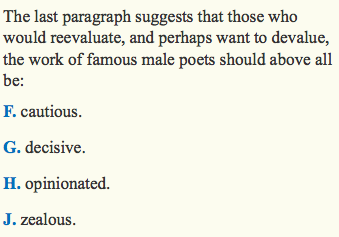 Example taken from ACT website.
Example taken from ACT website.
If you know the definition of the word “discernment,” you have an easy shortcut to the answer: “The problem with reevaluating and devaluing men poets is that it’s difficult to be sure you have good judgment when you’re doing it. How SHOULD you do it? With caution, or by being cautious.”
Even if you don’t know exactly what discernment means, however, the author goes on to explain further in the rest of the paragraph: "The author thinks that taking men poets down a peg too immediately, or quickly, is a problem…that means that people who do it should be cautious."
Using that clue, you could solve the question, even if you didn't know what "discernment" meant.
Strategies To Master Vocabulary In Context Questions
So what strategies can you use to master these two types of ACT Reading questions? I've put together a 3-step strategy guide below.
Strategy 1: Rephrase the information given
For questions that ask about words in context, define the word first in your head (or on scrap paper, whichever is easier) in the context of the sentence or paragraph, without looking at the answer choices. Remember, your rephrasing does not have to be elegant as long as it conveys the meaning. For instance, take a look at example C:
"She thinks I have a power that she doesn’t have and this brings out her envy and bad humor."
In this line, humor most nearly means…
My thought process: Let me replace the word with one that keeps the meaning of the sentence. “She thinks I have a power that she doesn’t have and this brings out her envy and bad state of mind.” Okay, that makes sense and is what the original passage said.
For questions that ask you to take a paragraph and choose the best answer that describes it, answer the question in your own words before looking at the answer choices. See example D:
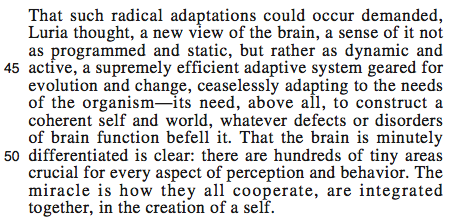

My thought process: Question is asking about what researchers thought about the brain. Okay, what does the paragraph say? We need a "new view of the brain" that includes the idea that the brain is "dynamic", "active", and "adaptive," NOT "programmed and static." So medical researchers used to think the brain didn’t change, but now they think it does. Okay, got it, now what're my answer choices?
Strategy 2: Cross out answers that clearly don’t fit
Sometimes, you can get to the right answer just by knowing what the wrong answers are. This is an especially useful strategy if there's an answer choice with a word that you don't know the meaning of. If you know that the other three answers are definitely wrong, it doesn't matter that you don't know what the meaning of the fourth answer is; by process of elimination, it must the correct choice. Let's take a look at this strategy in the context of example C, from before:

My thought process: Choices are personality, whim, mood, and comedy. I rephrased the sentence as “She thinks I have a power that she doesn’t have and this brings out her envy and bad state of mind.” Which choice is closest to “state of mind?” Personality: not really. Whim: No. Mood: yes. Comedy: no. The answer must be C. mood.
This strategy still works if you are trying to sum up the meaning of a paragraph in one word. I'll copy and paste example D again, so you don't have to scroll back up:


My thought process: The choices are dynamic, unchanging, paradoxical, or creative. My rephrasing of the paragraph was that medical researchers used to think the brain didn’t change, but now they think it does. Which of the choices are closest to meaning "didn't change" or "not changing"? Well, unchanging, obviously. What about the others? Dynamic is what they say the NEW view should be, so no. Paradoxical: there’s nothing about that in the text. Creative: nothing about that in the text. Answer must be B. unchanging.
Strategy 3: (Optional) Plug the definition back in
This strategy works best for the "here's the word, what's the meaning?" questions, because word-for-word substitutions are a lot simpler than word-to-sum-up-entire-paragraphs-of-information substitutions. Let's take one more look at example C, a "here's the word, what's the meaning?" question:
"She thinks I have a power that she doesn’t have and this brings out her envy and bad humor."
In this line, humor most nearly means…

My thought process: “She thinks I have a power that she doesn’t have and this brings out her envy and bad mood.” Yeah, that seems right. But I’ll double check:
“She thinks I have a power that she doesn’t have and this brings out her envy and bad personality.” That doesn’t really make sense – why would your personality need to be brought out? No. Especially when “mood” works better in this sentence.
 Get Plugged In by Rennett Stowe, used under CC BY 2.0.
Get Plugged In by Rennett Stowe, used under CC BY 2.0.
Whew. Where Do I Go From Here?
Are these strategies fine in theory, but you always run out of time on real ACT Reading sections? Discover how to avoid that terrible fate here.
Want more in depth guides like this? Read our other guides on Big Picture, Detail, Function, and Inference ACT Reading questions, as well as our deep dive into ACT Reading paired passages. And subscribe to this blog on the upper right.
What are the other types of questions you’ll find on the ACT, and what’s the best way to read the passage to answer them? We have strategies for reading passages effectively.
Want a breakdown of all the skills you’ll need to excel on the ACT Reading? Read about what's actually tested on ACT Reading.
Want to improve your ACT score by 4 points?
Check out our best-in-class online ACT prep program. We guarantee your money back if you don't improve your ACT score by 4 points or more.
Our program is entirely online, and it customizes what you study to your strengths and weaknesses. If you liked this Reading lesson, you'll love our program. Along with more detailed lessons, you'll get thousands of practice problems organized by individual skills so you learn most effectively. We'll also give you a step-by-step program to follow so you'll never be confused about what to study next.
Check out our 5-day free trial:
Have friends who also need help with test prep? Share this article!

Laura graduated magna cum laude from Wellesley College with a BA in Music and Psychology, and earned a Master's degree in Composition from the Longy School of Music of Bard College. She scored 99 percentile scores on the SAT and GRE and loves advising students on how to excel in high school.


































 Holly R.
Holly R.